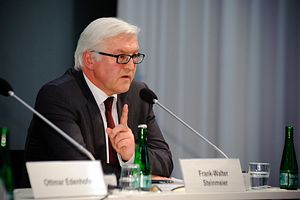Frank-Walter Steinmeier, Germany’s foreign minister and also chairman-in-office of the OSCE, is traveling to Uzbekistan, Kyrgyzstan, and Tajikistan this week. The agenda is typical, leading with security threats and promising meetings with civil society. Steinmeier’s visit, like that of most Western leaders to make the tour, is unlikely to move the needle on any of the region’s pressing issues, let alone turn up anything but boilerplate rhetoric regarding human rights.
According to the German Foreign Ministry Steinmeier will meet with political leaders and civil society representatives in all three states. The ministry’s overview of the trip notes, “In addition to bilateral relations, the focus of Steinmeier’s talks in the three land-locked Central Asian countries is on the fight against terrorism, regional cooperation, and economic connectivity in the OSCE area.”
As usual, terrorism was given top billing, despite the fact that regional cooperation may be a more critical talking point, as evidenced by last week’s standoff between Uzbekistan and Kyrgyzstan over their pockmarked border, much of which remains contested even after 25 years of independence.
Ahead of the trip, Steinmeier commented on Central Asia’s “strategic importance”:
Mostly overshadowed by international events, this is where the interests of the large regional powers – Russia, China, and Iran – clash. There are huge business opportunities and significant threats to stability, which should be anything but a matter of indifference to us.
There’s nothing new in the framing of the region as neglected internationally but strategic and beset by threats to stability. Given Steinmeier’s role as chairman-in-office of the OSCE, this makes sense in part. However, the OSCE also includes human rights, press freedoms, and fair elections in its mandate–viewing them as a fundamental part of achieving stability. By leaning on the hard security leg, however, Steinmeier and other European leaders are able to steer away from directly confronting the region’s deplorable human rights record. While such issues are reportedly discussed behind closed doors, there’s seldom visible movement and only scant progress.
In December, Germany withdrew from the Termez airbase in Uzbekistan, which it had used as a logistics hub for 13 years to move troops and equipment to Afghanistan. At the time, the Europe & Central Asia director of Human Rights Watch, Hugh Williamson, penned a commentary for Eurasianet in which he implored Germany to take the opportunity to recalibrate its diplomatic approach to Uzbekistan:
Germany’s calculus that human rights are secondary to security concerns did not pay off. In authoritarian Uzbekistan, disregard for human rights and rule of law fuels instability and further repression. Germany should use the opportunity presented by the end of the Termez agreement to craft a new human rights and security strategy towards Uzbekistan.
There’s no sign that Germany has decided to do so. According to RFE/RL, during Steinmeier’s March 30 meeting with his Uzbek counterpart, Abdulaziz Kamilov, the two discussed bilateral ties and the usual categories of topics: “regional and international issues, and the OSCE’s involvement in social and political developments in the region.”

































